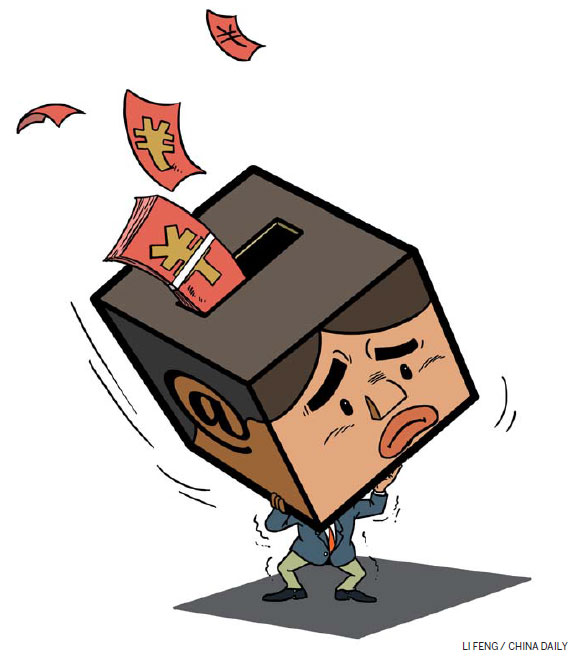Profits essential when cash burns out
Updated: 2016-05-06 06:56
By Geng Biao(China Daily Europe)
|
|||||||||
Online firms racing through money must not forget to develop sustainable business model
In just decades China has gone from copying foreign commercial internet models, even cumbersome ones, to building economic web models that foreign countries are imitating. However, the race among Chinese internet companies to offer huge subsidies to raise their market value has left foreign competitors wondering how they can survive in the long term.
Chinese companies' eagerness to get a bigger slice of the new capital market after its possible privatization has intensified the "money-burning" race, raising doubts whether this is a normal development model. The formation of the money-burning circle among internet enterprises is closely linked to the present development status of the online sector.

The internet-dependent generation, those born in the 1980s and 1990s, is on the way to becoming the leading consumer group in China. But because of their relatively small population, an internet-based consumption habit is yet to be formed.
Given this situation, may investors believe offering huge amounts of subsidies is an effective way of expanding the internet-user market and helping people form a consumption habit.
The heavy subsidy model is an instant, and the only, way of grabbing market share. Or so they believe. As enterprises that enjoy advantages in attracting or investing capital are willing to transfer certain interests to customers and use the internet to help change their daily consumption habits, consumers will gradually tilt toward subsidy-providing enterprises, thus raising the possibility of raising enterprises' market value.
On the one hand, the internet is being used to attract capital, which will then be used to expand the user market. On the other, the expanded user market will boost these enterprises' high-value and high-paced growth potential. This, in turn, will offer a database for capital introduction, creating a confusing "financing, money-burning and refinancing" circle. Can such a heavy subsidy model get the market's endorsement?
The rise of mobile internet has brought about the explosive development of online-to-offline businesses, especially through application platforms popular with internet users. But in terms of either traffic flow, or home delivery and take-out services, the O2O model is still in the money-burning stage without generating profits. Still, enterprises are making huge investments, resulting in fierce and even brutal competition among them because they believe the vast online domestic market holds great potential for generating profits.
For example, Jingdong, Jumei and LeTV have invested heavily to upgrade their software and hardware, by either buying copyrights or signing contracts with celebrities.
Such financing initiatives and the expected drastic rise in their market value have increased online enterprises' development potential. Bubbles, if there are any, are sure to burst one day, but every enterprise involved hopes to make enough gains before that day.
The government support for startups and for innovation has encouraged many to set up their own business. But some enterprises have gone bankrupt. New enterprises were set up, especially in the O2O sector, almost every day in the past year.
The blind use of subsidies to attract customers could spell doom for an enterprise if it fails to continuously gain capital financing. In this era of turbulent capital, the so-called chilly winter for the internet sector seems only a matter of time. The bankruptcy of some old cellphone manufacturers, communications firms, home furniture enterprises, and O2O platforms last year is a vivid reminder of the reality.
Many newly established online companies could get trapped in a vicious money-burning circle if they excessively depend on the capital market while failing to develop a manageable profit model. For any enterprise that fails to develop attractive products and a reliable profit model, the exit of capital is inevitable.
True, burning money does not necessarily mean creation of bubbles for internet enterprises. But to excessively cater to the capital market while failing to raise the quality of products does mean a shortsighted behavior that will inevitably be rejected by the capital market.
The author is a We Media writer based in Beijing. The views do not necessarily reflect those of China Daily.
Today's Top News
Inspectors to cover all of military
Britons embrace 'Super Thursday' elections
Campaign spreads Chinese cooking in the UK
Trump to aim all guns at Hillary Clinton
Labour set to take London after bitter campaign
Labour candidate favourite for London mayor
Fossil footprints bring dinosaurs to life
Buffett optimistic on China's economic transition
Hot Topics
Lunar probe , China growth forecasts, Emission rules get tougher, China seen through 'colored lens', International board,
Editor's Picks

|

|

|

|

|

|







